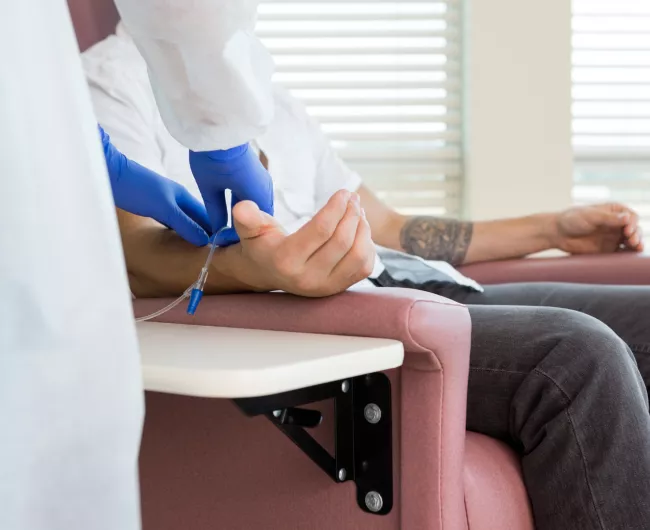Side effects of colorectal cancer treatment
Navigating the path through colorectal cancer treatment involves understanding and managing different side effects that may arise during the process.

Different treatments, different side effects
Each type of treatment may cause different side effects, and each patient may experience them differently. Common side effects like fatigue or nausea may affect some, while others may have reactions based on their unique health and genetics, highlighting the need for personalized care.
Common side effects
Surgery
Surgery for colorectal cancer may lead to side effects related to the surgical procedure itself. Common issues include discomfort, changes in bowel habits, or digestive concerns.
Chemotherapy
These powerful medications kill cancer cells, but they can also have unwanted effects like fatigue, skin reactions (such as rash), and flu-like symptoms.
Radiation
Radiation therapy uses high-energy rays to target cancer cells. It may lead to side effects including fatigue, skin changes, digestive issues, and localized hair loss.

Managing side effects
Dealing with side effects is difficult. A diagnosis was hard enough. When faced with symptoms, tell your care team. Treatment options may be available. Side effects may be a challenge on your path with CRC, but there are ways to alleviate many of them.
Tips for common issues
Dehydration
Dehydration means your body does not have enough fluids, and this can be dangerous. Ensure regular intake of water, popsicles, and electrolyte-rich beverages.
Skin rash and discomfort
Treatment may make your skin bumpy, red, itchy, or irritated. Treatment depends on the type of rash you have. Speak to your doctor about over-the-counter treatments or prescription drugs.
Nausea and vomiting
If you're feeling sick or throwing up, discuss prescription medications, early interventions, and alternative options — like ginger, acupressure, or peppermint — with your doctor.
Diarrhea
Watery bowel movements can be managed with prescribed medications, over-the-counter remedies, and dietary adjustments. Allow time for digestive system adjustment after colon resection. Stay hydrated and be open about changes with your doctor.
Fatigue
You can combat extreme tiredness and lack of energy through proper rest, strategic planning of activities, and seeking support. Share your symptoms with your doctor for advice.
Peripheral neuropathy
Neuropathy is caused by nerve damage that may lead to cold intolerance, tingling, or pain. Always report your symptoms promptly. Symptoms may be alleviated with anti-epileptics, anti-depressants, acupuncture, creams, and temperature adjustments. Most neuropathies improve after treatment, but some remain long-term.
Mucositis
Mucositis is inflammation of the digestive tract lining. Your doctor may suggest preventing opportunistic infections with saltwater rinses, anesthetics, coating agents, diet modifications, and pain medication. Treat proactively.
Hand and foot syndrome
With hand and foot syndrome, your skin and nails may blister and peel. You can ease discomfort with mild skin creams, cool showers, cotton socks, sun protection, and staying hydrated. Maintaining shorter nails can help.
Anemia
Anemia means you have a low red blood cell count, leading to fatigue and weakness. With your doctor, explore iron supplements, blood transfusions, diet changes, and other treatments.
Loss of appetite
When you lose your appetite, food is not appealing, and there is little or no desire to eat. To help, try smaller, more frequent meals, nutritional supplements, and meal-replacement shakes. Discuss your appetite with your care team.
Managing skin toxicity
Some of the most common side effects among colorectal cancer patients who take anti-EGFR therapies are dry skin, acne, and rashes. This download, provided with support from Amgen, can help you manage these side effects.
Our sponsor

Top resources

Christy Williams: Biomarker testing leads to successful treatment
Statistics suggested that Christy’s odds of survival were grim, so she leaned into her faith and kept a positive outlook. She tried to control what she could. And, critically, she received biomarker testing.

Gabriel Leblanc: How the Alliance changed my life
It’s scary to hear the “c” word, especially when you’re only 36. A million questions ran through Gabriel Leblanc’s mind, but only one seemed to matter. “How was I going to get through this?” Gabriel said.

Father’s journal inspires lesson-filled books
Michael Schnabel was determined to capture his daughter’s courage, strength, and love of life. He wanted to pass it on to her newborn son if she didn’t survive.





